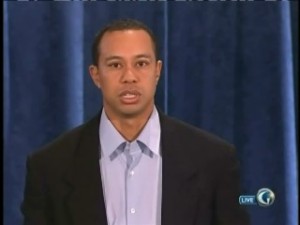The intimate and outrageous behavior that has led to Tiger Woods’ personal crisis is akin to a catastrophic air disaster and required a similar swift and comprehensive response similar to any airline suffering an accident.
The fact that he waited so long has been a serious setback to rehabilitating his image and has been roundly criticized by many, including two earlier postings in this space (Tiger Woods & Anyone Remember Letterman?).
But, in finally coming out from behind his Web site, Woods has made some positive moves; moves that others can learn from.
First, he established a “beachhead”, or meeting point with plenty of notice to the media. This was not a hit-and-run. Next, his remarks were directed to specific audiences, including family members, close friends, fans, young students under the tutelage of his education foundation, and, most notably, business partners (i.e., sponsors). He called stories claiming his wife, Elin, attacked him on Thanksgiving night “fabricated.” And he admonished the media and paparazzi to stay away from his family, including his mother.
The fact that he did not take questions in this round was not surprising, although very much an important open issue that needs to be addressed soon. Instead, he had set the ground rules and established boundaries. By doing that, when the time comes for one or more interviews, Woods now has clear message points he can bridge to in any give-and-take that tries to take him into details he’s not willing to discuss. Among those messages:
à He admittedly was unfaithful, had affairs and cheated.
à His behavior was unacceptable and he alone is to blame.
à Any conversations between he and his wife will remain between them; that, in other words, is off limits.
à And (to me, a most refreshing message rarely heard from a long-coddled athlete brought down by his own doing) he allowed his celebrity to mislead him into thinking social mores did not apply to him. (Click on video below.)
Was he genuine, honest, and seriously contrite? Any third person answer is subjective. No one can get into Tiger Woods’ head to know for sure. How he conducts himself in the future will go a long way toward answering those questions.
He does need to confront the media again, and soon, this time prepared to answer questions, tough questions that will attempt to circumvent the messages and boundaries he’s established. His answers need to be responsive, honest and lacking bite, no matter how provoked emotionally he might feel. But, as discussed above, he can be responsive and remain on message now that he has set a messaging foundation.
Again, Tiger Woods’ delay to this point has served only to dig himself a deeper hole. Hence, the lessons learned are negative and positive. In times of crisis, you need to react quickly and transparently. And have a plan that sets specific ground rules while also helping establish you as the best source of accurate, honest information.
Tiger’s tale has gotten way ahead of him because he waited so long. That, alone, has inflicted irreparable harm. But, at least he’s begun the process. It will be fascinating to see and hear what follows.





Thanks for the cogent analysis. On the topic of his lack of speed in responding to the crisis, I imagine that his first ‘in shock’ response was to see just what would come to light. And to get some feeling for how family, friends, sponsors, associates, etc. would react. I think he may have set up a scenario with his news conference where he can gain mythic stature if he handles the aftermath as well as he handles a golf course. America loves a redeemed, repentant sinner.
Perhaps Tiger Woods and Toyota have different problems but related symptoms. They waited too late to engage their challenge and will forever be chasing to get at the front of it. As they say on the farm, the horse has long ago escaped the barn.
There is an old adage in crisis communication: tell it all, tell it fast, and tell it straight. Both Tiger and Toyota would have taken hits on their reputations by following this advice. But look at where they are now. Are they really better for having let the situation take a life of its own? Arguably not.